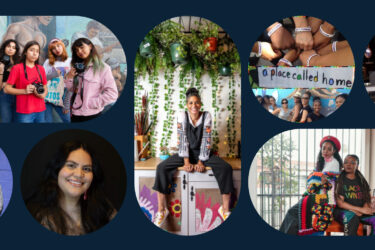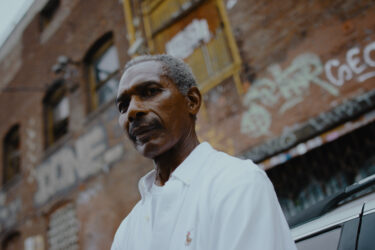We’re excited about all the supportive housing L.A. is creating for people experiencing homelessness, but we need to remember that 8,424 isn’t just a number—it represents real homes for real people. These homes will provide stability for veterans and seniors, people suffering from disability, addiction, and mental illnesses, vulnerable LGBTQ youth, and all of our neighbors experiencing homelessness.
We’d like you to meet the four people whose faces you might have seen on billboards around town this November. These are some of our friends who have personally experienced the life-changing power of supportive housing: safe, affordable homes paired with on-site programs that provide physical and mental health care, job training and life skills, addiction treatment, counseling and support groups, and many other types of services for residents. Here are their stories.
Lydia

About a quarter of the people experiencing homelessness in L.A. county are in need of supportive housing, and Lydia used to be one of them. A Southern California native, Lydia first experienced homelessness after her husband’s death drove her to alcohol and drugs in order to cope with her grief. Formerly a county worker, she lost her home, job, dog, and car as a result of her struggles with drug and alcohol addiction.
After Lydia had spent a number of years living outside, a caseworker she’d gotten to know approached her and asked to hear her story. As Lydia shared her story, the two cried together, and within two weeks the caseworker had paired Lydia with emergency housing, followed by targeted health services, and eventually supportive housing. Lydia points to the compassion of that caseworker as the turning point in her life. In fact, she still meets with a caseworker regularly, and together they review goals and talk through the supportive services that help Lydia continue to thrive.
Lydia has spent the last four years in stable housing, giving back to her community as a CHS Speak Up! Advocate and certified peer specialist through Westside Center for Independent Living & CSH Peer Support Program. Supportive housing made this reality possible for Lydia, it gave her the opportunity to heal and the resources to cope with her past trauma. As a peer specialist, Lydia uses her lived experience with homelessness to help others struggling to overcome difficult circumstances, through the work she helps give others the lifeline of hope that she was shown.
Zondre

Last year, the L.A. homeless count revealed that the number of people over the age of 62 who were experiencing homelessness rose 22%, meaning that 5,000 of our senior neighbors are currently living without stable homes.
Zondre used to be one of them. She grew up here in Los Angeles, always doing her best to help her family maintain stability no matter what was going on around them. Years of struggles and incarceration finally ended for Zondre when she moved into her new home, part of a 50-unit supportive housing complex dedicated to our senior neighbors. After moving into her new home, Zondre was struck by the sounds of birds singing outside of her window. Throughout her experiences with incarceration and homelessness, she’d seen birds flying by, but had never been able to hear them—now their song joyfully welcomes her home.
Dede

Approximately 40% of people experiencing homelessness in Los Angeles report that they’ve experienced domestic violence at some point during their lives, many of them as children living in unstable homes.
Dede left home at 18, having already suffered mental, physical, and sexual abuse. She turned to alcohol and drugs in order to cope with the trauma she’d been through, developing addictions that resulted in the loss of her home.
After experiencing homelessness for 15 years, supportive housing services helped Dede move into a home of her own, where she lives with her dog, Lucky Boy, and creates jewelry and artwork. Dede will marry her fiance Wilson next year.
Supportive housing works for people like Dede because in addition to a safe home, residents receive addiction counseling, mental health care, job training, and other supports that they need in order to overcome past trauma and gain independence.
Our urgency toward the goal of #EveryoneIn never waivers, but we’re celebrating along the way because L.A. voted and more than 8,000 units of supportive and affordable housing are on the way for people like Zondre, Dede, and Lydia. Housing that, paired with critical services, will change lives.



